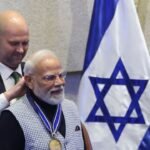Rawalpindi, 05 Feb. 2025 (ISPR)
Pakistan observed Kashmir Solidarity Day on Wednesday, reaffirming its unwavering support for the people of the Indian-Illegally Occupied Jammu and Kashmir (IIOJK) in their struggle for self-determination.
The day, a national holiday, began with special prayers in the mosques for the liberation of Kashmir. A minute's silence was observed throughout the country at 10 a.m. local time (0600GMT).
Thousands of people formed human chains on roads connecting the capital Islamabad to the Pakistan-administered Kashmir.
The main rally was held near the Parliament House in Islamabad, which was attended by a large number of people, including federal ministers, lawmakers, women, students, and Kashmiri leaders.
Diplomats, students, and civil society members attended another rally taken out from the Foreign Ministry.
Rallies, conferences, and seminars were also held in all four provincial capitals – Karachi, Lahore, Peshawar, and Quetta –, in addition to other big cities and remote towns, to denounce the “'human rights violations" in the Indian-administered part of Kashmir.
Inter-services Public Relations Department (ISPR) of armed forces issued a statement on the solemn occasion of Kashmir Solidarity Day, ' The Chairman Joint Chiefs of Staff Committee, the Service Chiefs, and the Pakistan Armed Forces reaffirm their unwavering support for the resilient people of Indian Illegally Occupied Jammu and Kashmir (IIOJK) in their just struggle for self-determination.
'We pay tribute to the indomitable spirit of the Kashmiri people, who have endured decades of oppression, state-sponsored brutality, and egregious human rights violations. Their unwavering resolve in the face of tyranny remains a beacon of courage and inspiration for the entire nation'.
The Pakistan Armed Forces strongly condemn the ongoing grave violations of human rights in IIOJK, including extrajudicial killings, enforced disappearances, and arbitrary detentions. These transgressions stand as a stark indictment of India’s blatant disregard for international law, humanitarian principles, and fundamental human rights.
We urge the international community, global human rights organizations, and the United Nations to take immediate and decisive action to address the plight of the Kashmiri people and ensure the implementation of United Nations Security Council resolutions in accordance with their aspirations.
The Pakistan Armed Forces remain steadfast in their commitment to the just cause of Kashmir and resolute in their duty to safeguard Pakistan’s sovereignty and territorial integrity. We stand shoulder to shoulder with our Kashmiri brethren in their rightful pursuit of freedom and dignity.
Long live Pakistan! Long live Kashmir!
The Jammu and Kashmir dispute coincides with the anniversary of the Independence Day celebrations of Pakistan and India, the two neighbors, whose fireworks refuse to drown out the anguish and sufferings of the Kashmiris in the Indian Illegally Occupied Jammu and Kashmir (IIOJK), cry for freedom for these Kashmiris is a stark reminder of the helplessness of the United Nations (UN), which had promised them a plebiscite and has not materialized even after more than seven decades.
Innumerable people, ranging from writers, researchers, politicians, and leaders to diplomats, have penned their thoughts on the travails of the Kashmiris arising from the Jammu and Kashmir dispute. K. Natwar Singh, a highly accomplished Indian diplomat and politician, was spot on in his realism: “Kashmir is the main hurdle in the Indo-Pakistan relationship, and the future lies in the past and has to deal with Pakistan pragmatically to avoid making a mess of the relationship."
Discussing the past, especially the UN's promise to hold a plebiscite in Kashmir, the late President Nixon, a historian in his own right, could not have been more forthright when discussing late Indian Premier Jawaharlal Nehru, opined that his Kashmiri ancestral ties made him obsessed with Kashmir to the extent of fierce resistance to letting the Kashmiris decide their fate, “a decision that would have certainly favored Pakistan than India.”
The colonial masters in 1947 acted exactly as they are known globally to commit ‘premeditated’ blunders, and Lord Mountbatten, the last Governor General of India, was no exception. As the British masters hurriedly gathered their belongings to leave the shores of India, their leanings and personal relationship with the Indian Congress leadership were reflected in the case of Jammu and Kashmir territory, and they made a mess of it, and, not surprisingly, a dispute took birth.
There was no secret that Lord Mountbatten, with the connivance of Sir Cyril Radcliffe, also gave an inlet to the Indian troops to enter into Kashmir by giving India Muslim majority Gurdaspur District, which Alastair Lamb, a reputed historian notes “On August 8, 1947, there emerged from Sir Cyril Radcliffe's establishment a provisional boundary map on which, there is strong evidence to indicate, the southern salient had been modified in what seemed to be Pakistan's favor by substituting for a small portion of the Lahore District the adjacent Ferozepore and Zira tehsils of Ferozepore District, thus extending Pakistan to the eastern side of the Sutlej. The same map also indicated that the three eastern tehsils of Gurdaspur District were now located on the Indian side of the Partition line.”
Furthermore, as the last Maharaja of Jammu and Kashmir was dilly-dallying with suggestions of a 'Standstill Agreement,' nursing a desire to make his State a sovereign one, and also contemplating accession with India, sensing the vagueness of the situation, the Indian troops acted on the pretext that the State had acceded to India. The immediate reaction of Quaid-i-Azam Mohammad Ali Jinnah, as indicated in Liaquat Ali Khan’s telegram of October 1947 to Lord Atlee, Prime Minister of Britain, was, "the Government of Pakistan cannot recognize the accession of Kashmir to the Indian Union, achieved as it was by fraud and violence.
The Dispute and the Towering Protagonist
After much wrangling between the two neighbors and the failure to settle the Kashmir conflict, they agreed to take the matter to the UN. Another significant development before the tension took place on August 15, 1947, when Pakistan accepted the Maharaja's ‘Standstill Agreement,' which stated that 'till new agreements were made, all existing agreements and administrative arrangements shall continue.' The Quaid indeed was a far-sighted statesman, and during the fighting in Kashmir, he held discussions with Lord Mountbatten, his Indian counterpart, in Lahore in November 1947, and understanding the gravity and significance of the dispute rightly and sagaciously supported the principled step to hold a plebiscite in Jammu and Kashmir. Jinnah was the first to propose a detailed arrangement for the holding of a plebiscite.
A careful look at the past reflects that Quaid's proposals were not unreasonable, as Alastair Lamb considers it practical and farsighted, as the 'United Nations was soon to suggest very much the same.' This was the astuteness that the Indian leadership agreed to, even though reluctantly and on December 12, 1947, Premier Nehru indicated to Premier Liaquat Ali, “he was considering, albeit, reluctantly, the invitation of the United Nations Observers to come to India and advise on the plebiscite." Thus, Quaid-i-Azam Mohammad Ali Jinnah is the leading and ‘pioneering protagonist’ in the incisive step to protect the rights of the people of Jammu and Kashmir, insisting on a referendum. Successive governments in Pakistan have been consistent on the principled stand that the UN is the right forum to decide the fate of the Jammu and Kashmir dispute, preferably by holding a referendum.
Subsequently, Prime Minister Liaquat Ali Khan and Prime Minister Nehru, in their correspondence, reflected a common understanding to take the dispute to the UN and to hold a referendum to ascertain the free and unfettered will of the people of Jammu and Kashmir. Katherine Frank, in the biography of the late Indira Gandhi, confirms Nehru's support for expression of the will of the people of Jammu and Kashmir to decide their fate as reflected in his November 2, 1947 All India Radio broadcast, “We are prepared when peace and law and order is established to have a referendum” and reiterated his pledge to his Pakistani counterpart, “We have agreed to an impartial inter-national agency like the UN supervising any referendum."
While history reflects India’s firm commitment to ascertain the will of the people of Jammu and Kashmir, the Bharatiya Janata Party (BJP)’s scorn for this ‘commitment’ by the opposition Congress Party continues unabated. L. K. Advani, a Senior BJP politician, in his biography, did not even spare Nehru, one of their country’s leading Founding Fathers, “It was at this critical stage of the war that Prime Minister Nehru, yielding to pressure from Lord Mountbatten, agreed, quite unnecessarily, to refer the Kashmir issue to the United Nations Security Council (UNSC) on January 1, 1948”.
Not to be left behind, the ministers of Premier Modi’s BJP government, in their incumbent arrogance, followed suit, and early this year, Finance Minister Nirmala Sitharaman sought to remind Parliament “that it was the country’s first Prime Minister Jawaharlal Nehru, who internationalized the Kashmir issue by taking it to the UN and even today, our neighbor is misusing this."
By Ambassador (R) Shahid Masroor Gul Kiani









